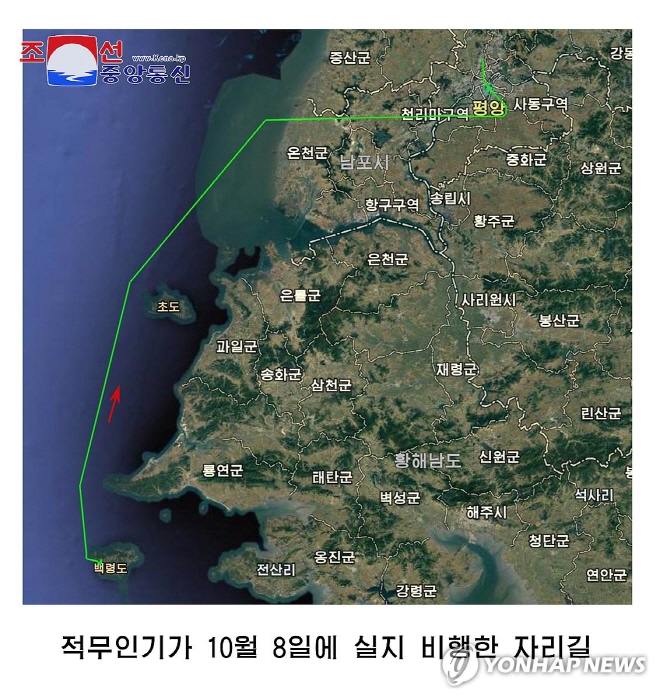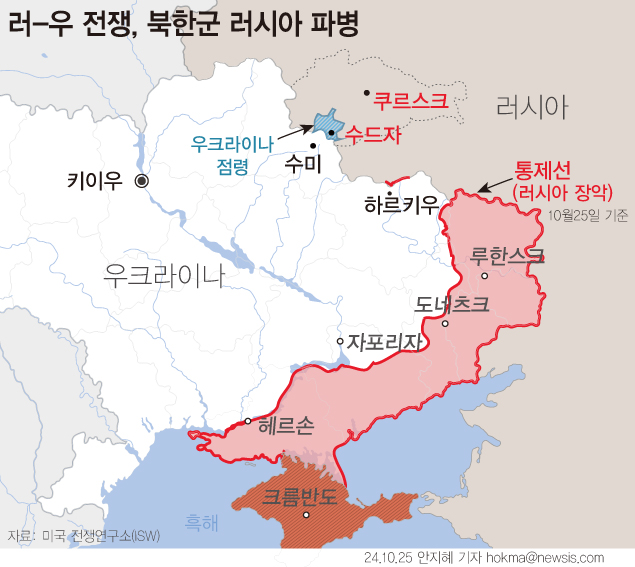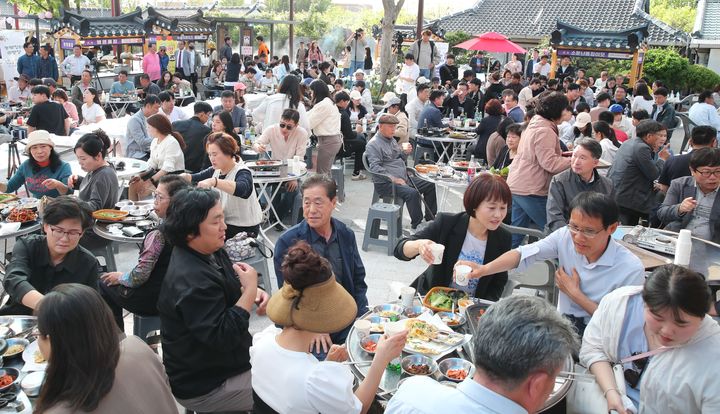▲ Kim Young-bok, Deputy Chief of Staff of the Korean People’s Army General Staff, who is known to be in charge of North Korean military units dispatched to Russia as a close associate of North Korea’s Kim Jong-un, is in the parade ranks as commander of the People’s Army Special Operations Force at the military parade commemorating the 75th anniversary of the founding of the Workers’ Party (October 10, 2020). Leading the way. ⓒCapture from North Korea’s Chosun Central TV/Yonhap News
North Korea’s Kim Jong-un plans to send about 12,000 combat soldiers from the elite ‘Storm Corps’ (11th Corps) to Russia’s war against Ukraine. Amidst the possibility that the ‘North Korean troops dispatched’ may be sacrificed as ‘bullet-catching mercenaries’ on the front line of the battlefield, Kim Jong-un has made a bet that he will receive a ‘blood price’ from Russia in the form of the transfer of cutting-edge military technology.
According to defense and diplomacy experts on the 29th, the best card that South Korea can use at this point is ‘psychological warfare against North Korea.’ If effective psychological warfare leads to a ‘North Korean version of the Wihwado Island retreat’ by the dispatched North Korean troops, Kim Jong-un’s victory could become self-defeating. Lee Seong-gye, who was the commander of the Chinese Ming Dynasty’s ‘Liaodong Conquest’ at the end of the Goryeo Dynasty, expected defeat due to heavy rain, lack of military supplies, and soldier desertion, and retreated from Wihwa Island to change the dynasty. This means that psychological warfare must be carried out as much as possible so that the North Korean military can retreat towards Pyongyang.
◆What is Kim Jong-un’s aim in sending ‘bloody troops’? … Russian military technology transfer
Considering the nature of the dispatched North Korean military, the terrain of the Ukrainian battlefield, and the characteristics of the war, it seems inevitable that the North Korean military will make great sacrifices. The People’s Army’s 11th Corps, called the ‘Storm Corps’ and ‘Killing Machine’, is well known for its military force dispatched to assassinate then-President Park Chung-hee in January 1968. These soldiers, who are equivalent to ‘special forces’ in our military, are tasked with infiltrating the enemy’s rear at the beginning of the war, destroying key infrastructure and military facilities, and killing and kidnapping in urban areas.
Song Seung-jong, professor of military science at Daejeon University (37th class at the Korea Military Academy), an international conflict expert who served as head of the U.S. Policy Division of the Ministry of National Defense and disarmament officer at the Mission to Geneva, told New Daily, “The 11th Corps infiltrates the enemy’s rear and carries out operations such as assassination, kidnapping, sabotage, and bombing of key figures. “It is specialized in special missions,” he explained, adding, “A place to hide is essential for those who mainly engage in one-on-one close combat and hand-to-hand combat, but most of the battlefields in Ukraine are made up of plains.”
He continued, “Furthermore, it is questionable what skills they will demonstrate on the Ukrainian battlefield, which is unfolding as a war of attrition, volume war, and long-term war using drones.”

▲ On the 27th, a North Korean Ministry of Defense spokesperson announced the final investigation results, saying that as a result of disassembling the drone that crashed in Pyongyang and analyzing its flight control program, it was confirmed that Baengnyeong Island in the West Sea was the takeoff point, presented a graphic of the flight path, and repeatedly claimed that the subject of the flight was the South Korean military. The Korean Central News Agency reported the contents on the 28th. The photo is a graphic of North Korea’s flight path on October 8 of a South Korean drone claimed by North Korea. ⓒYonhap News
◆Technology transfer to Russia is only a matter of time… Even with the support of lethal weapons from Korea, we cannot stop it.
Kim Jong-un’s biggest interest is the transfer of Russia’s cutting-edge military technology, including military reconnaissance satellite technology, intercontinental ballistic missile (ICBM) re-entry technology, and nuclear-powered submarine construction technology for launching submarine-launched ballistic missiles (SLBM). This is because in order to realize North Korea’s long-awaited goal of withdrawing U.S. troops from Korea and then mobilize nuclear force to invade South Korea, it must have the ability to directly threaten the U.S. mainland. To this end, Kim Jong-un is creating a situation in which it is difficult for Russia to refuse technology transfer through the ‘blood bet’ of large-scale deployment of troops.
Russia’s technology transfer is becoming a fait accompli due to North Korea’s deployment of troops. Professor Song said, “There is no way for us to stop the transaction between Russia and North Korea,” and added, “With North Korea’s deployment of troops, this war will reach a new inflection point.”
◆Korea’s support of lethal weapons, Ukraine war → ‘Inter-Korean proxy war’ → North Korea fears of hitting Baengnyeong Island
Some argue that South Korea should respond to North Korea’s deployment of troops by supporting lethal weapons to Ukraine. So far, South Korea’s support for lethal weapons has been considered a useful bargaining chip to kill the ‘New North Korea-Russia Treaty’, which stipulates automatic military intervention in case of emergency.
However, at this point, if South Korea supports lethal weapons, it could end up in the form of South Korea and North Korea fighting an ‘inter-Korean proxy war’ on the battlefield in Ukraine. There are concerns that the inter-Korean proxy war will dilute the war crimes committed by Russia and North Korea and give North Korea an excuse to justify its military provocations against South Korea.
A North Korea expert who requested anonymity said, “The focus of the war in Ukraine could shift from Russia and North Korea’s war crimes to South Korea’s support of lethal weapons,” and added, “North Korea recently claimed that South Korean drones infiltrated Pyongyang and mentioned the original strike on Baengnyeong Island. “In the situation of an inter-Korean proxy war, such provocations by North Korea could be a fatal blow to the South Korean government, especially in the situation where South Korea’s opposition party is very vulnerable to propaganda and instigation by totalitarian forces,” he said.
Some point out that it is not too late to decide whether to support lethal weapons after the new US administration is inaugurated after the US presidential election on the 5th of next month.
Another expert said, “It is unclear whether Ukraine can clearly win even if Korea supports lethal weapons,” and added, “A victory for Ukraine is impossible with Korea’s power alone without decisive support from the United States and the North Atlantic Treaty Organization (NATO).”
He said, “If the newly inaugurated U.S. administration decides to end the war in a way that Ukraine wins, Korea may also consider supporting lethal weapons.” He pointed out, “You could end up in dire straits at home and abroad by crossing a river that doesn’t exist.”

▲ According to Ukrainian media, advance units of North Korean troops trained in eastern Russia have arrived in areas bordering Russia and Ukraine, including Kursk in western Russia. Ukrainian intelligence authorities estimated the number of North Korean troops dispatched to Russia at about 12,000. ⓒNewsis
◆Need to transform North Korean troops into ‘Wihwa Island Retreat’ through psychological warfare against North Korea
Some suggest that now is the time to develop a strategy against North Korea that will encourage North Korean soldiers and residents to rebel against the Kim Jong-un regime and start riots.
An anonymous expert on North Korea said, “Kim Jong-un will turn North Korean soldiers into cannon fodder during Russia’s war of aggression against Ukraine and embezzle most of the money they earn.” “It can quickly spread within North Korea through diplomats,” he predicted.
He continued, “North Korean residents who sent their children to the military will protest, and cracks that could lead to the collapse of Kim Jong-un’s regime will begin to appear. We need to dig into that gap. So that the North Korean military can turn its guns on Kim Jong-un, as they did in the Wihwa Island Retreat at the end of the Goryeo Dynasty.” “We need to create a situation where that happens,” he emphasized.
However, although the psychological warfare targeting North Korean soldiers on the battlefield in Ukraine is important, it is also being pointed out that the South Korean National Intelligence Service’s public involvement in this is a handshake.
Another expert said, “The question of whether National Intelligence Service agents will be deployed in psychological warfare on the battlefields of Ukraine should be kept private,” adding, “Some are openly mentioning psychological warfare and criticizing the government’s declassification of strategic secrecy on irrational grounds. In doing so, we are helping North Korea.” criticized.
◆On November 7th, North Korea must raise the issue of dispatching troops to Russia at the UN UPR.
Raising the issue of North Korea’s troop deployment at the UN’s ‘Universal Human Rights Periodic Review’ (UPR) on North Korea on the 7th of next month is also being discussed as a method. UPR is a system in which the 193 UN member countries take turns reviewing their own human rights situation and whether recommendations have been implemented.
Since North Korea’s weapons and military support to Russia violates UN Security Council sanctions, there is justification for raising the issue at the UPR. Experts say the South Korean government should highlight Kim Jong-un’s inhumane behavior in the international community by pointing out that North Korean people are being dragged to slaughterhouses and sacrificed.
However, the issue of North Korea’s troop dispatch was omitted from the preliminary written inquiry recently submitted by the Ministry of Foreign Affairs to the Office of the High Commissioner for Human Rights (OHCHR).
Shin Hee-seok, a legal analyst at the Transitional Justice Working Group (TJWG), said, “I don’t know if the Ministry of Foreign Affairs will raise this issue through advisory remarks even while the UPR is in progress,” and added, “The Ministry of Foreign Affairs working-level staff is showing a passive attitude, saying they should not offend Russia.” UPR “We need to use the same international stage to actively ask questions,” he pointed out.

